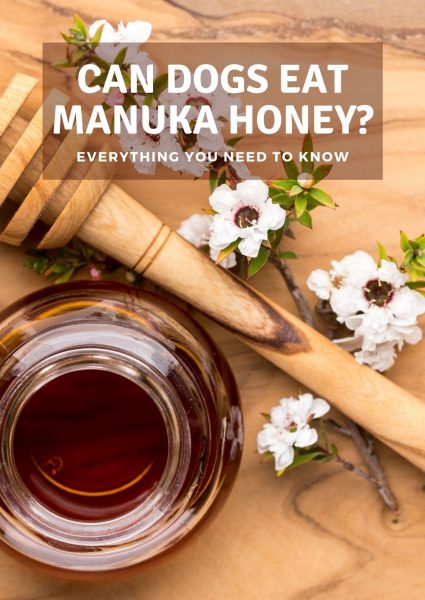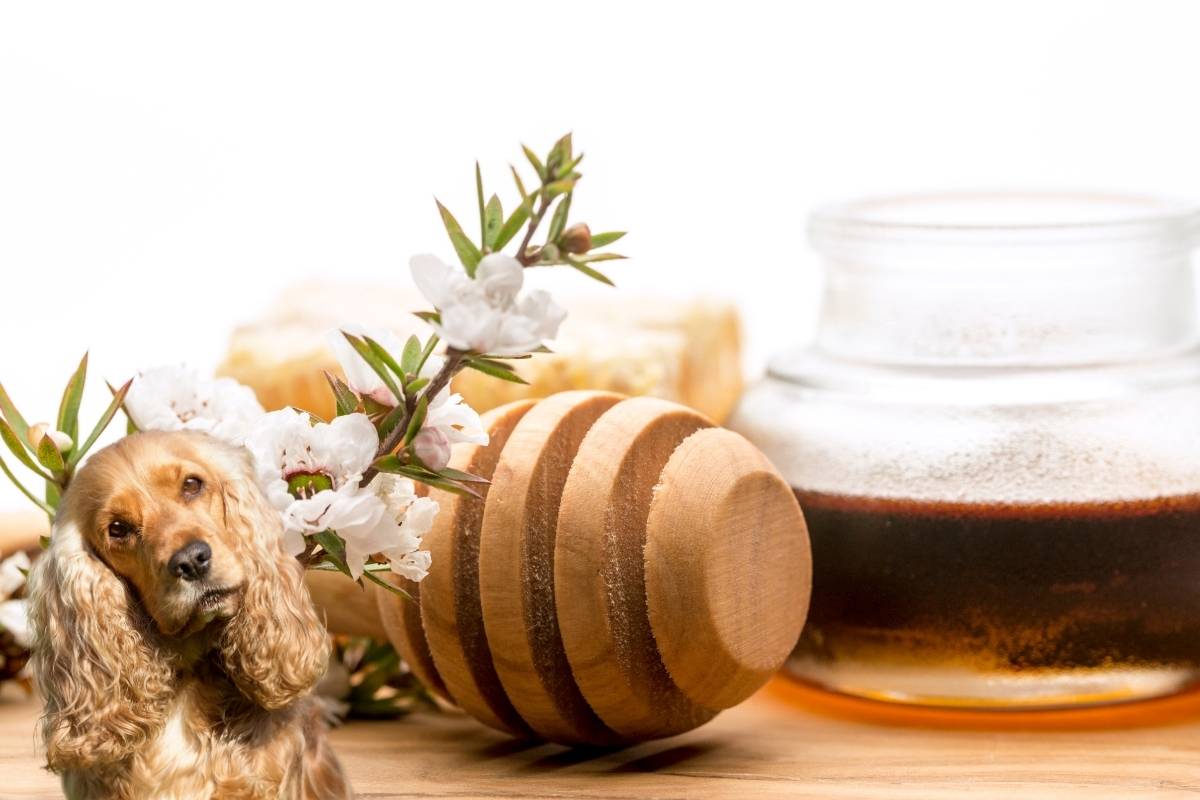Honey has been in use by human beings for hundreds of years due to its healing properties. With the advancement in science, these properties were put to the test in animals. Research has shown that honey asserts its medicinal properties in animals as well with equal efficiency.
Manuka honey can be safely given to dogs and can be of benefit in a number of ways. Both as a treat on food or applied on wounds, Manuka honey has a range of qualities making it suitable for dogs of all breeds and ages.
Raw unpasteurized honey possesses the following properties:
- Antibacterial properties
- Antiviral properties
- Antifungal properties

Manuka honey can be given to dogs
Honey contains a healthy amount of hydrogen peroxide, which is a strong antiseptic.
But not all types of raw honey are equally beneficial. They differ in their properties based on changes in their composition.
A difference in composition appears when honey is synthesized after sucking nectar from different types of flowers.
The most beneficial type of honey is the one that is prepared when bees pollinate flowers of the Manuka tree.
Honey prepared after pollination of manuka tree flowers is commonly known as manuka honey.
Why is Manuka honey good for dogs?
Manuka honey has a range of qualities that are not found in other honey making it an ideal option for dogs to eat.
To better understand the enormous qualities possessed by manuka honey, let’s take a look at the various chemical components found in it.
Methylglyoxal (MGO)
MGO is the most important constituent of manuka honey, which gives longer-lasting healing properties. A scale has been established based on the amount of MGO in honey called UMF Grading System. Manuka honey with different concentrations of MGO is used against various pathological conditions.
For example, Honey with UMF 16+ is used against oral bacteria, and UMF 20+ is effective against Kennel cough
Dihydroxyacetone (DHA)
It is a natural tanner, and it converts to MGO during the process of honey formation.
Leptosperin
Leptosprin imparts antibacterial and anti-inflammatory properties to manuka honey.
Manuka honey has received well-deserved fame for its healing properties. It has stood out from other types of honey due to its internal and external healing properties.
Recently the US Food and Drug Authority approved wound dressings infused with manuka honey, thus acknowledging its effectiveness in wound healing. Honey has a pH in the range of 3.4-6.1, which means it lies in the acidic region, thus preventing bacterial growth.
Manuka honey can be used as a topical ointment for minor cuts and wounds.
Clean the wound thoroughly and apply honey to it. Apply a simple bandage on it, and don’t let your dog lick its wound; otherwise, desired benefits can’t be attained.
Benefits of Manuka honey for dogs
What can Manuka honey be used for in dogs?
Manuka honey is produced mostly in the southern hemisphere, especially New Zealand and Australia. It has high antioxidant properties, which means it keeps your dog active and slows the signs of the aging process.
Antioxidants also give protection to your dog against cancer and other harmful effects caused by pollution and fertilizers.
Moreover, manuka honey provides prebiotic support for the gut, thus maintaining the proper bacterial balance.
So a teaspoon a day keeps the veterinarian away.
The antiviral properties of manuka honey are effective against Kennel cough, which is one of the most common infections in dogs. A daily dose of honey with oral hygiene prevents bad breath.
Talking about manuka honey’s antibacterial properties, research has shown that it is effective against more than 60 bacteria. These include:
- Escherichia coli
- Staphylococcus aureus
- Streptococcus pyogenes
- Salmonella typhimurium
- Pseudomonas aeruginosa
- Proteus mirabilis
Using Manuka honey for dog skin problems
Dogs suffer from skin problems a lot. They can be due to various allergens or immune disorders.
Conventional medications against skin problems can produce side effects without even treating the root cause of the disease.
The use of manuka honey brings relief in itchiness and allergic symptoms.
Inflammation and redness caused by itching can also be treated with an ointment of manuka honey.
Honey can be applied multiple times a day, depending upon the need.
How much Manuka honey can dogs eat?
Now we have established that giving manuka honey is beneficial for dogs, let’s discuss how much and which honey should be given.
Honey having a higher amount of methylglyoxal has stronger therapeutic properties.
Honey should have at least UMF more than 10 to enjoy the benefits of it.
If you are giving honey orally, the amount given depends on the weight of the dog.
Start by giving smaller amounts of honey in the beginning and then gradually increase it.
For example, for a small dog weighing less than 20 pounds, half a teaspoon should be enough twice a day.
For medium dogs (20-60 pounds), a teaspoon twice is enough.
For large dogs weighing more than 60 pounds, two teaspoons twice are given.
Conclusion
Caution must be taken if your dog is younger than one year.
Diabetic dogs must not be given any honey because sugar content can do more damage than good to them.
Manuka honey is getting famous day by day, and the world is recognizing the wonderful healing properties possessed by Manuka honey.
As in all things concerning the health and wellbeing of your dog, you should treat this article as informational and, before commencing any form of treatment, you should always get the professional advice of your vet.




